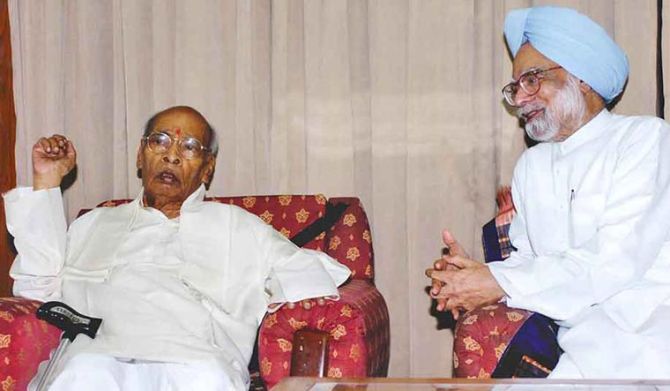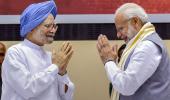'Those who are talking of adopting the Narasimha Rao-Manmohan Singh policy must understand now that what was a reform then is no longer a reform now,' argues Sukumar Mukhopadhyay who was associated with the 1991 economic reforms.

In the context of the slowdown in the economy, some analysts have been of the view that the government should give up its present policy and adopt the Narasimha Rao-Manmohan Singh policy of 1991.
Here I am writing to say that it is a complete misconception to think so.
First, we have to know what that policy was.
That policy was nothing more than the 22 conditionalities given by the International Monetary Fund which had to be implemented for getting a loan from it.
At that time the foreign exchange stock with the government was just $1 million which economists used to describe as 'small change'.
I know this policy inside-out since as member Budget when Dr Manmohan Singh was the finance minister, I was in the task of accommodating and implementing these conditionalities. They were the following:
- Bring down the rates of duty of Customs
- Bring down the rates of duty of excise
- Relax the QR, which means minimising the quantitative restrictions on import
- Relax the imports by opening the licence provisions, which means enlarging the OGL, that is, Open General Licence
- Doing away with state control on new manufacturers, which means abolishing the DGTD (Directorate General of Technical Development)
- Doing away with permission from departments for importing goods
- Doing away with the cost-control department
- Advaloremisation of duties
- Abolishing of exemptions, and several others
These are all good policies and by no means easy to implement.
We had to have many meetings with importers and manufacturers to find out what would be acceptable on both sides.
We had to face the resistance of what was then known as the Bombay Club, a conglomeration of the entrenched businessmen who wanted to continue with protectionism.
Steel manufacturers like Tata Steel and Steel Authority of India were simply screaming 'blue murder' when we wanted to bring down steel import duty from 70% to 50% to ultimately 25%.
The same with electronics and ball bearings and all. Baggage duty was brought down from 250% to 100% to 50% and the resistance came from our own officers.
These were basically the policies of liberalisation. Good policies.
But they were the policies of the IMF and not of Manmohan Singh.
In fact, the press went on attacking him that these policies were against his policy of control.
He frankly admitted that now being the finance minister, he could have a different policy which was the policy of liberalisation.
Now the main point is that once we have already implemented the policy of the IMF, we cannot do it again.
The DGTD (Directorate General of Technical Development) is no longer there.
The cost-control mechanism is no longer there. Rates of duty are already lower than what the World Trade Organisation had indicated.
The liberalisation of the IMF-type is already complete. So it cannot be done again.
Reforms will always be there, but they will be of different types.
Reforms vary from time to time.
There was a time when control was a reform.
That was the time of Indira Gandhi.
Then decontrol was a reform. Public-private participation became a new reform.
Even in the pure economic theory, the concept of reform keeps on changing.
John Maynard Keynes and Friedrich August Hayek were two prominent economists of the Great Depression era with sharply contrasting views of what was reform in that context.
The arguments they had in the 1930s have been revived in the wake of the latest global slowdown.
The concept of reform is like a flowing river in which you cannot step twice.
The correct concept is that reform is taking action towards what is contemporaneously thought to be better.
When Manmohan Singh took over as finance minister, he called a meeting of 15 financial advisors within three days.
It was in that meeting he gave three directions.
The first was to remove all budgetary support (both loan and equity) to PSUs.
The second was to gradually reduce subsidies on food, fertiliser and petroleum products.
The third was to do away with the 'Inspector Raj'.
All these have been implemented gradually and the process is still on.
So those who are talking of adopting the Narasimha Rao-Manmohan Singh policy must understand now that what was a reform then is no longer a reform now.
Sukumar Mukhopadhyay is a member, Central Board of Excise & Customs (retired).











